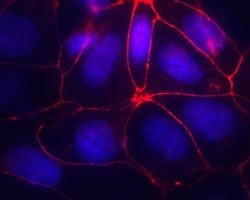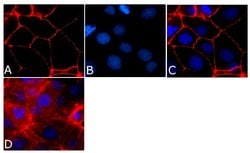Learn More
Occludin Monoclonal Antibody (OC-3F10), Alexa Fluor™ 594, Invitrogen™


Description
Reactivity of this antibody with the occludin protein has been confirmed by immunofluorescence and Western blotting (un-conjugated). Tissues/lysates tested: T84 cell line (human intestinal epithelium), MDCK cells (canine kidney), Caco-2 cells (human colon adenocarcinoma), MTE7B (Mouse) and rat liver This antibody reacts specifically with mammalian occludin.
Occludin is a 65 kDa protein that can exist in a variety of phosphorylated forms, ranging up to approximately 82 kDa. Occludin is thought to be involved in regulating both the localization and the function of occludin. Polyunsaturated fatty acids are known to up-regulate occludin expression, increasing the transendothelial cell resistance and reducing the cellular permeability to large molecules. The level of occludin varies greatly depending on tissue; in brain tissue, occludin is highly and continuously expressed at cell-cell contact sites, whereas non-neural tissues show lower expression and discontinuous distribution. Overall structural features of the occludin protein are highly conserved in all the species examined. Under-expression of tight junction proteins, including occludin, is a key molecular abnormality responsible for the increased permeability of tumor endothelial tight junctions, which contributes to brain tumor edemas.Specifications
| Occludin | |
| Monoclonal | |
| 0.5 mg/mL | |
| PBS with 4mg/mL BSA and 0.1% sodium azide; pH 7.4 | |
| Q16625, Q28269, Q61146, Q6P6T5 | |
| OCLN | |
| GST-fusion protein consisting of the C-terminal region (∽150 aa) of human occludin. | |
| 100 μg | |
| Primary | |
| Canine, Human, Mouse, Rat | |
| Antibody | |
| IgG1 κ |
| ELISA, Immunocytochemistry, Western Blot | |
| OC-3F10 | |
| Alexa Fluor 594 | |
| OCLN | |
| AI503564; BLCPMG; Occludin; occludin 1B; Ocl; Ocln; phosphatase 1, regulatory subunit 115; PPP1R115; tight junction protein occludin; tight junction structural protein | |
| Mouse | |
| Protein A | |
| RUO | |
| 100506658, 18260, 403844, 83497 | |
| 4° C, store in dark | |
| Liquid |
By clicking Submit, you acknowledge that you may be contacted by Fisher Scientific in regards to the feedback you have provided in this form. We will not share your information for any other purposes. All contact information provided shall also be maintained in accordance with our Privacy Policy.








